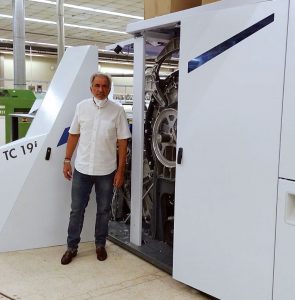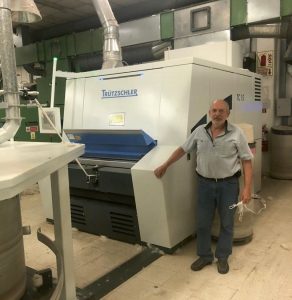Since the implementation of a full-service concept back in 2014, Trützschler Card Clothing (TCC) has been able to establish itself as a leading provider of card clothing and mounting services in the Peruvian textile industry.
TW Special Report
TCC products like Novotop 58, Magnotop 58 and Precisetop 58 that are dedicated to combed cotton applications and used in the intelligent card TC 19i, have achieved big steps toward success. As the following examples show, TCC is continuously striving for improvement together with its customers.
The Peruvian Textile History
Going back almost 10,000 years, Peru has one of the longest histories of textile production in the world. When humans first started using agriculture, Peruvian fiber manipulation began with spun fibers that were used to make cords and nets. This was followed by using looms to spin animal-based fibers like alpaca and llama wool, as well as cotton fibers. The Peruvian civilization has been producing cotton for more than 4,500 years. In this context, the pre-Incan process of spinning and fabric production can still be considered valid today.
Processing Cotton In The Peruvian Textile Industry
Peru uses traditional hand-picking methods for cotton, which allows a more brilliant white and softness in the fiber because machine-picked cotton tends to get scratched and yellowed during mechanical treatment processes. The primary varieties found in Peru are Pima, an extra-long staple fiber (ELS) and Tanguis, a long stable cotton (LS). Pima is harvested in the northern region of Piura, while Tanguis is primarily grown in the central coastal region of Peru. Overall, Peruvian cotton blends are widely recognized as high-quality, fine, soft and durable fibers.
The Peruvian apparel industry is specialized in knitted cotton garments, and its main competitive advantage is its level of integration. The production chain is fully integrated, from the fiber through to yarn production, fabric manufacturing and production of the final garment. This integration is strengthened by the constant technological modernization of factories and the high level of specialization achieved by entrepreneurs and workers.
About 4,000 tons of yarn — out of the total of 7,000 tons of yarn that is produced each month — goes into the spinning of locally grown cotton like Pima or Tanguis. The following Trützschler customers have dedicated themselves to this.
 Trützschler Customers In Peru — Algodonera Peruana
Trützschler Customers In Peru — Algodonera Peruana
Algodonera Peruana is specialized in the export of high-quality, 100-percent cotton yarn. A total of 22,224 ring spindles and 20 Trützschler cards produce an average of 240 tons per month. The production focus lies on Pima combed-cotton yarn in the range of 20 to 50 Ne (Number English: The number of times the length of one pound of yarn can be divided by 840). This approach has achieved success, with well-known ready-to-wear companies like Polo and Lacoste trusting Algodonera Peruana’s yarn quality. According to CEO Javier Piqueras, the company’s strategy focuses on maintaining and improving quality levels within its operations to constantly increase productivity. In this context, the company has steadily invested in its entire production chain, including two new Trützschler intelligent TC 19i cards that it recently added to its facility.
 Trützschler Customers In Peru — Empresa Algodonera S.A.
Trützschler Customers In Peru — Empresa Algodonera S.A.
Empresa Algodonera S.A. is a company committed to spinning 100-percent cotton yarn. About 150 employees, 17 cards and 16,320 ring spindles produce an average of 200 tons of yarn per month. Its product range includes Pima combed-cotton yarn from Ne 20 to Ne 60, and Tanguis cotton-carded and combed from Ne 16 to Ne 40. It also spins imported US upland cotton from Ne 16 to Ne 40. Empresa Algodonera S.A. exports to the US and Europe, so its top priority is to achieve the best possible quality for its customers. The company has made continuous investments into quality control, fiber analysis, and automatic humidity and temperature control in recent times. Furthermore, it places a sharp focus on the maintenance and quality of the wires used in carding to ensure the quality of its yarn. “We have been using Trützschler card clothings for many years,” says Ernesto Rodriguez, Plant Manager at Empresa Algodonera S.A. “They have helped us to improve our overall quality standards, as monitored by our AFIS equipment, and we are truly very satisfied.”
August 13, 2021




